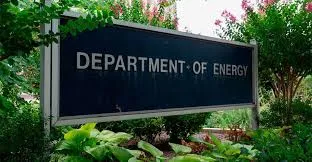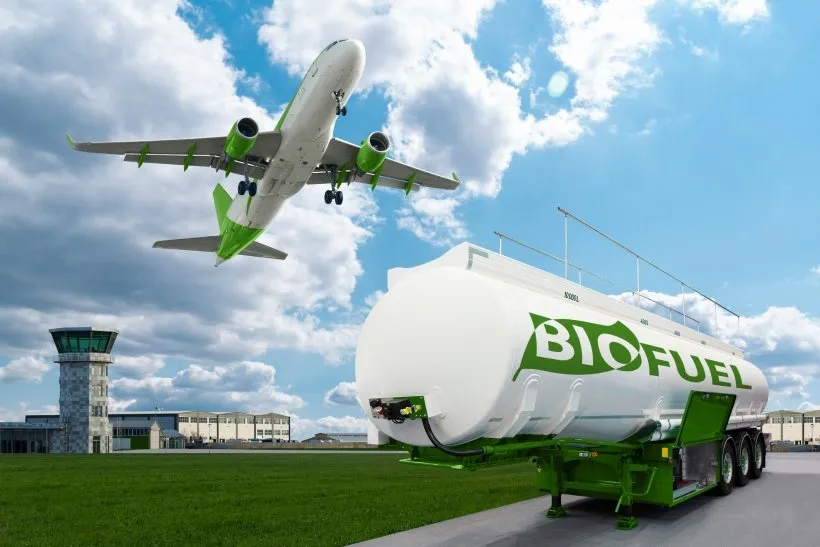Sustainable Aviation Fuel: For a safer environment
The United States Department of Energy Bioenergy Technologies Office (BETO) empowers energy companies and aviation stakeholders by supporting advances in research, development, and demonstration to overcome barriers for widespread deployment of low-carbon sustainable aviation fuel (SAF).

Sustainable Aviation Fuel made from renewable biomass and waste resources have the potential to deliver the performance of petroleum-based jet fuel but with a fraction of its carbon footprint, giving airlines solid footing for decoupling greenhouse gas (GHG) emissions from flight.
The U.S. Department of Energy is working with the U.S. Department of Transportation, the U.S. Department of Agriculture, and other federal government agencies to develop a comprehensive strategy for scaling up new technologies to produce SAF on a commercial scale.
Demand for jet fuel is expected to go all time higher over the next decades. SAF can help meet goals for cutting Green House Gas emissions from domestic and international aviation.
Sustainable Aviation Fuel: Safe, Reliable, Low Carbon
SAF is a biofuel used to power airplanes that has qualities similar to regular jet fuel but a lower carbon footprint. SAF, depending on the feedstock and methods utilized to manufacture it, has the potential to significantly lower life cycle GHG emissions when compared to traditional jet fuel. Some new SAF approaches even have a GHG footprint that is negative.
Because of its lower carbon intensity, SAFs are an essential solution for decreasing aviation GHGs, which account for 9%-12% of US transportation GHG emissions, according to the US Environmental Protection Agency.
Menu for Sustainable Feedstocks for SAF Production
An estimated 1 billion dry tons of biomass can be collected sustainably each year in the United States, enough to produce 50–60 billion gallons of low-carbon biofuels. These resources include:
- Corn grain
- Oil seeds
- Algae
- Other fats, oils, and greases
- Agricultural residues
- Forestry residues
- Wood mill waste
- Municipal solid waste streams
- Wet wastes (manures, wastewater treatment sludge)
- Dedicated energy crops.
This huge resource contains enough feedstock to meet the aviation industry’s expected fuel demand, as well as extra quantities of drop-in low carbon fuels for use in other modes of transportation for the production of high-value bio products and renewable chemicals.
SAF Benefits beyond Lowering GHG Emissions
Growing, sourcing, and manufacturing SAF from renewable and waste resources has the potential to offer new economic opportunities in farming areas, enhance the environment, and potentially increase aircraft performance.
Farmers can earn more money.
Growing biomass crops for SAF production allows American farmers to earn more money during the off season by providing feedstock to this new industry, while also securing benefits for their farms such as reduced nutrient losses and improved soil quality.
Services for the Environment
Biomass crops can help to reduce erosion while also improving water quality and quantity. They can also boost biodiversity and store carbon in the soil, resulting in on-farm and environmental advantages across the country. Producing SAF from wet wastes such as manure and sewage sludge lessens pollution burden on watersheds while retaining powerful methane gas—a critical component—a key contributor to climate change—out of the atmosphere.

Improved Aircraft Performance
- Because many SAFs include fewer aromatic components, they burn cleaner in airplane engines. This implies fewer hazardous substances are emitted locally surrounding airports during take-off and landing. Aromatic components can also operate as precursors to contrails, which can amplify the effects of climate change.
The production of biofuels benefits American jobs.
- The United States is the world’s leading producer of biofuels, which benefits our domestic economy, provides jobs, and cuts GHG emissions.
- Expanding domestic SAF production can help sustain the benefits of our biofuel business while also developing and securing new economic benefits across the country.
These include positions in:
- Feedstock production in farming communities
- Construction for building cutting-edge bio refineries
- Manufacturing for operating SAF bio refineries and infrastructure
- Aviation, including countless pilots, crew members, maintenance workers, and other industry professionals.
BETO Research Expands the Market for SAF
More production paths and feedstocks are required to meet increased demand for SAF in order to achieve US and aviation climate goals.
SAF can be produced using a variety of technologies that break down biomass and waste resources and recombine them into energy-dense hydrocarbons via physical, biological, and chemical interactions. SAF’s hydrocarbon blend, like conventional jet fuel, must be tweaked to provide critical qualities required for safe, reliable aircraft operation.
BETO-funded researchers are exploring unique methods for manufacturing SAFs from renewable and waste feedstocks that meet tight fuel criteria for use in current airplanes and infrastructure in collaboration with bio refiners, aviation firms, and farmers. BETO is collaborating with laboratory and industry partners to create new SAF pathways and fuel formulations that will allow for the testing and certification required to ensure that these fuels are fully compatible with existing aircraft and infrastructure.
Emerging SAFs
- SAF from wet waste, National Renewable Energy Laboratory: SAF from wet waste is a carbon-negative fuel that draws on carbon energy stores in cheap, widely available food waste, animal manure, and other wastes with high water content.
- Los Alamos National Laboratory, bio-based polycyclic alkane SAF: When upgraded with ultraviolet light and catalysts, bio-acetone made from a variety of biomass resources, such as corn stover or bioenergy crops, can yield SAF with 12% more energy than conventional jet fuel.
- SAF from carbon-rich waste gases, Pacific Northwest National Laboratory: Waste carbon monoxide from industrial processes can be captured and converted into ethanol for easy conversion into “alcohol-to-jet” SAF using bacteria.
Please send your feedback / suggestion to aksinhalko@gmail.com
I love how this blog gives a voice to important social and political issues It’s important to use your platform for good, and you do that flawlessly
Incredibly helpful post, like a GPS for my lost thoughts.
I appreciate the balance and fairness in The writing, like a perfect partner who always keeps things interesting. Great job!
You have such an authentic and compelling voice.
This post is bursting with brilliance — wow!